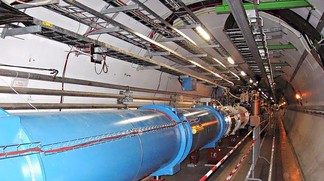Jun 14 2013
On May 30, the CERN Council adopted an update on its 2006 European strategy for particle physics in a meeting hosted by the European Commission in Brussels. EPFL Professors Tatsuya Nakada and Oliver Schneider participated in the historical event as Secretary of the European Strategy Session of Council and Swiss Scientific Delegate to the CERN Council, respectively.

Professor Nakada has been associated with CERN since the 1970’s, when he joined it as a PhD student in the Intersecting Storage Rings project - the world’s first proton-proton collider. He later became spokesperson for LHCb, an experiment that explores the events following the Big Bang that allowed matter to form the universe, where the EPFL group made a substantial contribution. In that role he oversaw the planning, design and construction of the project before stepping down in 2008. By that time he contributed to establish a strong tie between CERN and EPFL, having been appointed at the High Energy Physics Laboratory (LPHE) in 2003.
Fulfilling his mandate as Scientific Secretary of the European Strategy Session of Council since 2011, Professor Nakada has played a central role in co-ordinating CERN’s European particle physics strategy, organizing all the meetings and discussions and leading to the current "European Strategy for Particle Physics, Update 2013" document. At the same time, Professor Oliver Schneider from the LPHE has been appointed scientific delegate of Switzerland to the CERN Council. In his capacity, he is representing the voice of Swiss particle physics community for scientific matters and advises the head of the Swiss delegation to the CERN Council for important decisions. For the Council discussions and approval process, his contribution was essential.
The new strategy outlines several ways forward for collaboration, communication and investment in particle physics across research organizations and universities in Europe by exploiting the world-leading facilities of the Large Hadron Collider. In addition, the strategy provides impetus for continued global scientific outreach to engage the public on an international scale.
“The strategy update sets the priorities not only for the CERN programme, but is also expected to guide the national communities and the funding agencies in Europe dealing with elementary particle physics”, say Professor Schneider.